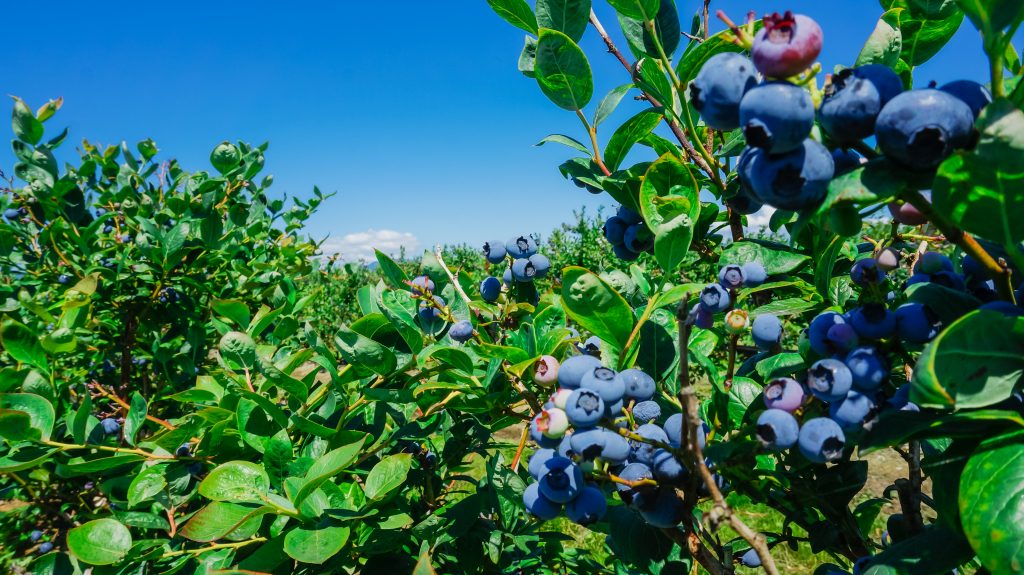The University of Florida Institute of Food and Agricultural Sciences (UF/IFAS) hosted a water and nutrient management workshop at the Citrus Research and Education Center in mid-February. In addition to seminars, a grove tour was provided to demonstrate a nutrient-rate trial currently underway at the center. Kelly Morgan, UF/IFAS professor of crop nutrition, spoke on recent activity to update citrus best management …
Watch for Flower Thrips in Blueberries
Flower thrips (Frankliniella bispinosa) are insects that attack Florida blueberries and cause harm to the fruit. According to the University of Florida Institute of Food and Agricultural Sciences (UF/IFAS) research, larvae and adults feed on every part of the flowers including ovaries, styles, petals and developing fruit. The effects of this invasive species include damage to the fruit by reducing …
Florida Strawberries Face an Increase in Angular Leaf Spot
By Clint Thompson Angular leaf spot disease has been problematic for Florida strawberry growers. The colder winter weather contributed to its impact this season, says Natalia Peres, professor of plant pathology at the University of Florida Institute of Food and Agricultural Sciences (UF/IFAS) Gulf Coast Research and Education Center. “It usually becomes worse when we have freeze events which we’ve had …
Managing Tree Health After Removing IPCs
Researchers and growers have found that individual protective covers (IPCs) can keep young trees free of HLB for two or more years while providing additional benefits like improved tree growth. The IPCs work by keeping HLB-infecting Asian citrus psyllids out of the tree canopies. But trees outgrow the covers and must eventually be removed. Researchers have found that about 60% …
IFAS Blueberry Management Tips
Florida blueberry growers are just a few weeks away from harvest season. University of Florida Institute of Food and Agricultural Sciences offers growers management tips for this point in the season. Producers should monitor for botrytis and apply control measures as needed. Any applications of fungicides prior to a need for overhead irrigation as freeze protection can help reduce disease …
Neopestalotiopsis on the Move in Strawberries
By Clint Thompson Neopestalotiopsis disease has been widespread across strawberry fields in the Southeast. It started in Florida and has continued in South Carolina. Natalia Peres, professor of plant pathology at the University of Florida/IFAS Gulf Coast Research and Education Center, said the increase in disease infestations is not surprising. “It’s not surprising considering we’ve had some weather like some rain and …
Everglades Research and Education Center to Celebrate 100 Years
The University of Florida Institute of Food and Agricultural Sciences (UF/IFAS) Everglades Research and Education Center (EREC) will celebrate its 100-year anniversary on Friday, Feb. 10, 2023. The event will include research tours of the EREC and feature various talks focusing on the center’s history. Scott Angle, UF/IFAS Senior Vice President, will provide an administrative welcome. Keynote speakers include Jim …
Using Artificial Intelligence to Assess Storm Damage
University of Florida Institute of Food and Agricultural Sciences (UF/IFAS) researchers are using artificial intelligence (AI) technology to quantify damage to fruits and vegetables caused by extreme weather events, such as Hurricane Ian in 2022. When Ian struck on Sept. 28, it brought winds up to 155 mph and caused as much as $1.56 billion in damage to crops, livestock and …
Citrus Leaders Testify on Weather Disasters
Florida agriculture took a wallop from Hurricane Ian last year. Throw in another hurricane (Nicole) and a freeze, and the disaster losses stacked up. The state’s citrus industry took a particularly hard hit. On Jan. 17, citrus industry representatives headed to Tallahassee to testify before the Florida Senate Agriculture Committee about the toll these weather events had on an already …
Florida Peaches Running Behind Schedule
By Clint Thompson The Christmas freeze event brought much needed chill hours to Florida’s peach crop. But it still lags behind historical averages, according to Jose Chaparro, associate professor in the University of Florida Institute of Food and Agricultural Sciences (UF/IFAS). He said the crop this year will be delayed as a result. “We’re significantly behind. It looks like our bloom …










